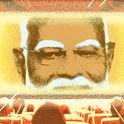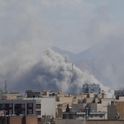“We want to live in a world free from war,” tweeted Jeremy Corbyn last week, posting a film of himself inveighing against the invasion of Iraq in 2003. His backdrop was the US-UK night-time bombing of Baghdad. “Military personnel” should be “de-escalated” on both sides of the Ukrainian border, he intoned.
A week ago the Stop the War campaign group, of which Corbyn is deputy president, launched a petition which is explicit about this equivalence. Mentioning Iraq in a list of failed interventions, it adds: “Stop the War opposes any war over Ukraine, and believes the crisis should be settled on a basis which recognises the right of the Ukrainian people to self-determination and addresses Russia’s security concerns.”
“Our focus is on the policies of the British government which have poured oil on the fire throughout this episode. In taking this position we do not endorse the nature or conduct of either the Russian or Ukrainian regimes.”
It is hard to know where to start on such extreme false equivalence. But the fundamental issue is simple: there is only one aggressive invading power here, Putin’s Russia. Everyone else—Ukraine, Nato, the British government—are the resisters to Putin’s military aggression and violation of the borders of an independent sovereign European state. And there is only one person who can stop this war: Putin, who started it.
Russia is clearly wrong, Ukraine is clearly right. The question is whether Putin can be stopped from undermining and possibly destroying Ukraine as an independent state, and also perhaps starting a war on another of his borders with Europe, such as with the Baltic states, in his quest for—well, no one is quite sure what. It is clear that he seeks a nationalist westward expansion to reverse at least some of the disintegration of the end of the Soviet Union, shoring up his fascist regime thereby.
This is emphatically not a war between Russia and Nato. Ukraine isn’t a member of Nato. The question of whether it might have become so—or might still do so—is irrelevant to the violation of its borders. And no one, including the British government, has suggested that Nato can or should repel this invasion by direct use of its own military forces. In all the debate about soft cops Macron and Scholz and tough cops Johnson and Biden, the only real difference has been the willingness to listen to Putin’s long monologues of self-created grievances and fanciful recreation of Russian and European history to suit his megalomania.
The issue here isn’t Russian security but Russian aggression. The only cause of Russian insecurity is the threat to Putin’s regime posed by free and independent peoples and nations on his borders.
Can we stop Putin? In the immediate future, and in his immediate occupation of the parts of eastern Ukraine which he has declared Russian, probably not. So the outcome depends on whether, over time, the combination of Ukrainian resistance and western sanctions has a sufficient impact to get him to withdraw, and not to attempt something similar on other European borders.
In the sanctions league, for all the tough talk, I suspect Johnson’s Britain will be as problematic as Scholz’s Germany. Scholz must have been in agonies over the decision—announced yesterday—to halt approval of the Nord Stream 2 pipeline, which could drastically undermine Russia’s clout in a key energy export market. Johnson will be in agonies about cancelling Russian oligarchical investment in London and drastically reducing the Tory party’s dependence on Putin-associated tycoons. But if they want to stop this war, and the ones that might follow, these are prices which must be paid.
Oh, and if Corbyn is in any doubt about the rights and wrongs, he should watch on playback President Zelensky’s speech to the Munich security conference last Saturday, just days before Putin announced the dismemberment of his country.
The bit that got me was Zelensky’s passage about the school on the Delimitation Line in Donbas. “Next to it there are 30 children who go… no, not to Nato, but to school.” A school repeatedly shelled by Russian forces.
Volodymyr Zelensky himself first appeared on TV screens not as Ukraine's president, but as an actor in a popular comedy series. In his TV role in Servant of the People, he played a school history teacher who became president by fluke after a video of his foul-mouthed rant against corruption went viral online. It was a fairy-tale story that captured the imagination of Ukrainians disillusioned with politics. Three years ago, he was elected president.
The trouble is, Putin is for real.













